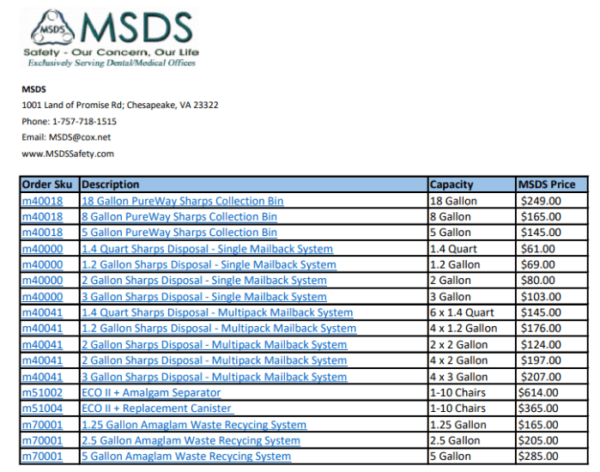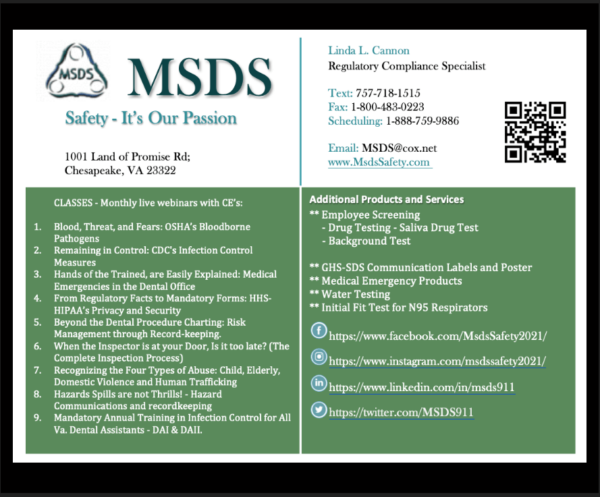From Your Regulatory Compliance Specialist – Linda Cannon. Medical Waste Management Regulations

Regulated Medical Waste Management Regulations
Subject: 9VAC20-120 & 9VAC20-121 On Apr 25, 2023, at 2:27 PM, Rohrer, Priscilla (DEQ) Priscilla.Rohrer@deq.virginia.gov wrote:
Hi Linda,
Thank you for reaching out. I am happy to provide some clarification regarding the revised storage requirements for generators of regulated medical waste, which includes dental offices.
This change in the regulations was made based on the input of a Regulatory Advisory Panel (stakeholder group) to be in line with industry standards and minimize issues such as odors, bacterial growth, etc. as a result of unnecessary long-term storage of regulated medical waste.
The definition of “generate” (9VAC20-121-10) in the new regulation notes that timeframes associated with storage are linked to the date the waste is placed in storage (i.e. RMW bag/container is full and bag/container closed or tied off), not the date the waste is generated. In other words, a bag or container is not considered to be in storage while it is still being filled with waste, so the time limits haven’t kicked in yet.
There is not an expectation for weekly or monthly pick-up of bags or containers that are not yet full. The clock does not start ticking until a bag or container is full – and that is when it needs to be closed / tied off, dated, moved to an appropriate storage area, and shipped offsite no more than 10 days later max (for large quantity generators) or 45 days later max (for small quantity generators).
There is updated information on the VA DEQ’s Regulated Medical Waste webpage, including a link to the compliance assistance document for generators (also attached) which addresses the storage concern on page 2 (last green box).
The regulation now states that ” Generators of less than 250 gallons of regulated medical waste per calendar month shall arrange for the removal of all regulated medical waste stored onsite at least once per calendar month and provide shipment to a facility permitted to receive it for transfer, treatment, or disposal. No regulated medical waste shall be stored onsite for more than 45calendar days, and no more than 250 gallons of regulated medical waste shall be stored onsite at any given time.” Additional clarification to the definition of generate was also provided in the amended regulation to note that time frames associated with storage are linked to the date the waste is placed in storage (i.e. RMW container is full / bag is tied off ), not the date the waste is generated. So, there is not an expectation for monthly pick-up of containers that are not full. I hope this information alleviates the concerns. We understand this is a change to the regulation regarding small generators, but the change was made with the input of a Regulatory Advisory Panel to be in line with industry standards and minimize issues such as odors, bacterial growth, etc. as a result of long-term storage of regulated medical waste. Please let me know if there are any additional concerns or questions with the amended regulation.
New Regulated Medical Waste Management Regulations per the DEQ. Virginia’s EPA.

To open the link, press on the line item you want to order. This will open a pdf doc. Please press on the line item you want again. This will take you to MsdsSafety’s website store.
Do not sign any sharps or waste management, pick up!
Stericycle is taking it upon themselves to play the same game they’ve always played. This could be other companies also. Once you sign a contract, you’re bound to that contract. Some are telling me that they’ve signed a contract for a weekly pick up or even a monthly pick up that’s not with the regulation state, do you not have to do! Read the contract. Stericycle’s contract for some, will read that they can increase the pricing three times a year and you’re bound that contract for five years when you try to cancel the contract at the end of the term you have a very limited window to cancel. You must read your contract, the last time I looked at one you had to cancel in the 4th, 5th and 6th month, before the end of the contract. If you try to cancel it within the last 90 days of the contract, they will tell you that’s not acceptable and you’re bound for an additional five years. Some sales reps will tell you you can change things anytime you want. Unless you get them to initial that contract, stating your wishes and getting the company i.e. similar to Stericycle, then don’t believe it they are trained to manipulate the conversation. If you go back to the company and say here she told me this they will state what does the contract read. They don’t care what the sales rep said to you or what you think the sales representative said to you.
There are great companies out there that will only charge you when you call them. I will try to make a list and send them out.
Meanwhile, if it’s more conducive for you to do a mailbox system versus any contract, I’ve supplied the fees below. These are standard single units. If you found a better price, let me know I’m sure I can finagle the power to be to adjust some fees but I’m going to need an actual fee from them. The pricing below includes the hazard shipment fee when you mail it. You will not have to add an additional fee to mail these boxes out.
Do not Panic and sign with Stericycle.

A 250 percent increase in price over seven years would probably prompt any business owner to do some investigating.
It certainly gave Dr. C.R pause and led her to do some pretty extensive research into Stericycle, a Lake Forest, Illinois-based medical waste disposal company. She found she wasn’t alone in feeling aggravated and deceived at how the company was doing business.
Dr. C.R. is among a number of dentists from across the country who have contacted the ADA to report escalating fees that were not explicitly stated in their original contracts and contracts that automatically renew with only a small window to cancel before it re-ups for several more years.
For Dr. C.R., who practices in Farmington Hills, Michigan, it started earlier this year when she received a flier offering pickup for medical waste at a price that intrigued her enough to study her invoices for what she was currently paying.
The new company advertised its price at $60 per pickup, which is typically quarterly in the medical waste business. Dr. C.R. had signed a contract with Stericycle in 2009, so she was curious how this new rate would compare.
In 2009, Dr. C.R. said she was paying Stericycle a monthly charge of $105 — $315 each quarter — to pick up one 28-gallon container that typically wasn’t full. By the first quarter of 2016, Dr. C.R. said her quarterly bill had risen to $1,100: a nearly 250 percent increase from when she originally signed a contract.
“The original contract stated there may be increases related to rising fuel costs or increased fees Stericycle incurred for disposal that they could pass on to the customer,” Dr. C.R. said.
“I figured those kinds of things happen. That’s reasonable. But I think we can all agree that fuel prices have not been consistent since 2009, but somehow my invoices from Stericycle have increased consistently.”
Dr. C.R. said she didn’t keep up with the increasing charges from Stericycle because the amount was debited automatically along with numerous other charges that came through the dental office’s account.
When she turned to the internet to find out more about Stericycle, Dr. C.R. said she was surprised to learn the company was the subject of a number of lawsuits. In October 2015, the Illinois attorney general’s office announced a $26.75 million settlement with Stericycle for allegedly overcharging government entities in several states by millions of dollars, resolving the company’s alleged violations of the U.S. and State False Claims Acts.
The lawsuit was brought by a whistleblower that was a former Stericycle employee on behalf of the federal government and later 14 states and the District of Columbia, according to a statement from Illinois Attorney General Lisa Madigan.
The lawsuit alleged that since 2003, Stericycle implemented a plan to charge automatic price increases without giving any notice to its government customers in violation of state and federal false claims laws, according to the statement from the Illinois attorney general’s office.
Stericycle’s automated price increases were purportedly fuel and energy surcharges, but they did not reflect actual increases in fuel and energy costs.
According to the lawsuit, these fraudulent price increases — amounting to 18 percent every nine months — violated prices set in the company’s contracts.
Illinois, California, Delaware, the District of Columbia, Florida, Indiana, Massachusetts, Nevada, New Jersey, North Carolina, Rhode Island, Tennessee, Virginia and the federal government will receive portions of the settlement.
In a separate lawsuit, Hagens Berman, a law firm based in Seattle, filed a class action lawsuit in 2013 against Stericycle alleging that the company misled its customers regarding pricing. In January, the firm filed a motion to certify the class of plaintiffs.
“The first rule: a deal is a deal. Stericycle entered into fixed-price contracts and it was obligated to honor those prices,” according to the lawsuit, which can be viewed at hbsslaw.com/cases/stericycle. “The second rule: tell the truth. Stericycle was obligated to give its customers accurate and complete information about its service contracts and the prices it charged.”
Stericycle did not respond to requests for comment.
Dr. E.K, of Buena Park, California, is one who doesn’t believe Stericycle held up its end of the deal. He said that he signed a contract with Stericycle in May 2014 that included a three-year term under the assumption he was locking in a rate of $180 for pickup at a minimum of twice per year.
“That’s the purpose of signing a long-term contract: to avoid a future price increase,” Dr. E.K said.
According to Dr. E.K, the contract stated that Stericycle may periodically raise the fee to accommodate a rise in operational cost. Over the next two years, Dr. E.K received quarterly bills for $220, $279, and ultimately $398. The lowest bill he received was for $108 — after Stericycle came by and his office was closed so they did not haul away any waste.
“When I signed the contract, I thought each bill would be $180,” Dr. E.K said. “My staff called Stericycle and they said they raise fees by 18 percent every nine to 12 months.”
In order to be released from his contract, a Stericycle employee told Dr. E.K he would have to pay out the remainder of his contract. His math showed that amount to be $400.
When Stericycle did the math, they told Dr. E.K he would owe $1,777 to be released from the contract.
“I don’t know how this company has been allowed to go on for so many years,” Dr. E.K said.
Dr. V.F, of Mechanicville, New York, has been a Stericycle client for nearly 20 years and didn’t realize he had a problem with the company until his son, Dr. V.F joined his practice and noticed the bills seemed high.
The father and son ultimately figured out that their bills were increasing by 17 percent every six months — something that was not outlined in their original contract with Stericycle.
Dr. V.F said he started out paying Stericycle around $80 a month, which increased to $1,853 a month by the end of this relationship with the company.
He said he called Stericycle to end his business relationship with them, was told he could not terminate his contract and the company threatened to take legal action against him.
Like other dentists who wanted to get out of their contracts, Stericycle told Dr. V.F he would have to pay out the contract. He refused and Stericycle ultimately agreed to let him out of his contract without charging him a fee.
The same thing happened to Dr. N.R in San Francisco. Dr. N.R said he was on a year-to-year contract with Stericycle, noticed his fees were increasing and he wanted to hire another vendor to dispose of his practice’s medical waste.
He called Stericycle to tell them he did not want to renew his contract and was told he electronically signed a longer-term contract to which he was bound. Dr. N.R said he never signed anything but was told if he wanted to cancel the service, he would have to pay hundreds of dollars.
Dr. N.R filed a complaint against Stericycle with the Better Business Bureau, he said. Stericycle ultimately dropped the issue and told Roth they “would do a professional courtesy” by letting him out of the contract he said he never signed.
“I would caution ADA members that before they sign anything with Stericycle to read the fine print,” Dr. N.R said. “It’s very underhanded and suspicious in the way they practice their business.”
The ADA offers guidance on the Center for Professional Success on how to navigate contracts containing auto renewal provisions at Success.ADA.org/contract-auto-renew.
The Michigan Dental Association has been cautioning its members with the same message: be careful when it comes to signing contracts.
“Some members are surprised to hear that they can be held to contracts that their staff signed. That’s why it is so important not to delegate this authority to any staff member and to educate your staff that you are the only one who should agree to contracts on behalf of the practice,” said Karen Burgess, executive director of the Michigan Dental Association, which has also received multiple complaints from members about Stericycle.
“As with any contract, it is important to read, understand and seek legal advice if you have any uncertainties, before you sign it. Don’t rely on any verbal explanations that you might hear from a salesperson. And even if you think the contract looks good, be sure to do your due diligence and consider other options.”
Below are the link for Federal Guidelines regarding Medical Waste Management Regulations
9VAC20-120. Regulated Medical Waste Management Regulations (repealing 9VAC20-120-10 through 9VAC20-120-1000).
https://www.deq.virginia.gov/land-waste/solid-hazardous-waste/specialty-waste/medical-waste
9VAC20-121. Regulated Medical Waste Management Regulations (adding 9VAC20-121-10 through 9VAC20-121-420).
https://www.deq.virginia.gov/home/showpublisheddocument/17232/638151765980070000
Statutory Authority: § 10.1-1402 of the Code of Virginia; 42 USC § 6941 et seq.; 40 CFR Part 257. Effective Date: March 15, 2023.
https://law.lis.virginia.gov/admincode/title9/agency20/chapter121/section10/
Fun signs found at offices!
Send us what fun signs do you have at your offices. We will add them in our Newsletter.


You can reach MSDS through:
Website
https://www.facebook.com/MsdsSafety2021/
https://www.instagram.com/msdssafety2021/
https://www.linkedin.com/in/msds911



